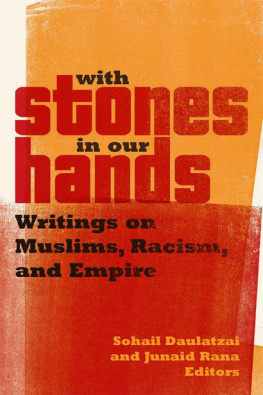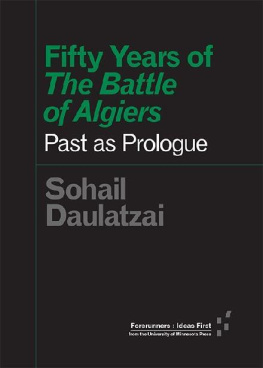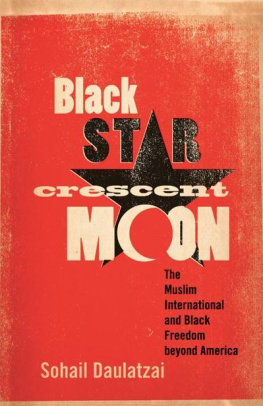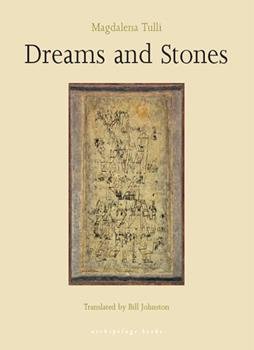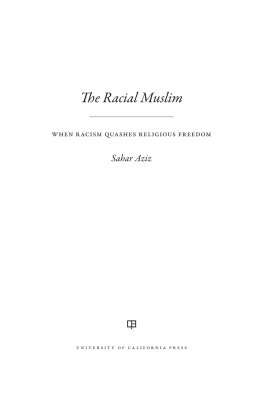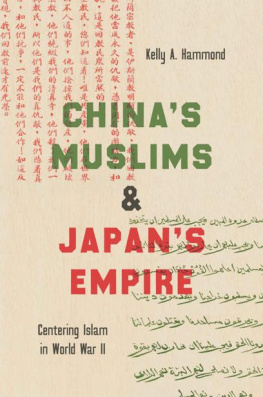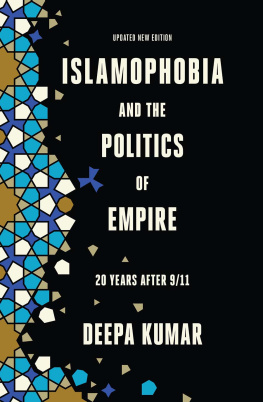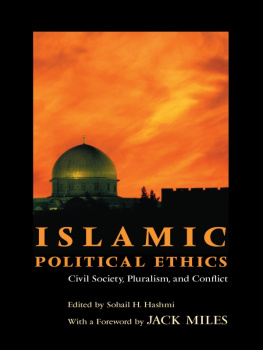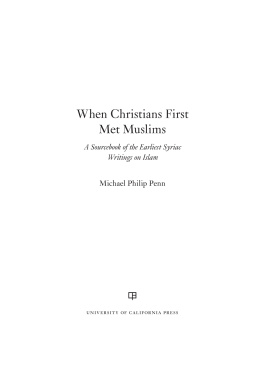Sohail Daulatzai - With Stones in Our Hands: Writings on Muslims, Racism, and Empire
Here you can read online Sohail Daulatzai - With Stones in Our Hands: Writings on Muslims, Racism, and Empire full text of the book (entire story) in english for free. Download pdf and epub, get meaning, cover and reviews about this ebook. year: 2018, publisher: University of Minnesota Press, genre: Politics. Description of the work, (preface) as well as reviews are available. Best literature library LitArk.com created for fans of good reading and offers a wide selection of genres:
Romance novel
Science fiction
Adventure
Detective
Science
History
Home and family
Prose
Art
Politics
Computer
Non-fiction
Religion
Business
Children
Humor
Choose a favorite category and find really read worthwhile books. Enjoy immersion in the world of imagination, feel the emotions of the characters or learn something new for yourself, make an fascinating discovery.
- Book:With Stones in Our Hands: Writings on Muslims, Racism, and Empire
- Author:
- Publisher:University of Minnesota Press
- Genre:
- Year:2018
- Rating:5 / 5
- Favourites:Add to favourites
- Your mark:
- 100
- 1
- 2
- 3
- 4
- 5
With Stones in Our Hands: Writings on Muslims, Racism, and Empire: summary, description and annotation
We offer to read an annotation, description, summary or preface (depends on what the author of the book "With Stones in Our Hands: Writings on Muslims, Racism, and Empire" wrote himself). If you haven't found the necessary information about the book — write in the comments, we will try to find it.
With Stones in Our Hands: Writings on Muslims, Racism, and Empire — read online for free the complete book (whole text) full work
Below is the text of the book, divided by pages. System saving the place of the last page read, allows you to conveniently read the book "With Stones in Our Hands: Writings on Muslims, Racism, and Empire" online for free, without having to search again every time where you left off. Put a bookmark, and you can go to the page where you finished reading at any time.
Font size:
Interval:
Bookmark:
Muslim International
Sohail Daulatzai and Junaid Rana, Series Editors
Sohail Daulatzai and Junaid Rana, Editors
Muslim International

University of Minnesota Press
Minneapolis London
Nadine Naber and Atef Said, The Cry for Human Rights: Violence, Transition, and the Egyptian Revolution, was previously published in Humanity: An International Journal of Human Rights, Humanitarianism, and Development 7, no. 1 (2016): 7190; copyright 2016 University of Pennsylvania Press; reprinted with permission of the University of Pennsylvania Press.
Excerpt from Zainab Syed, Poems on Malcolm, published by permission of the poet.
Copyright 2018 by the Regents of the University of Minnesota
All rights reserved. No part of this publication may be reproduced, stored in a retrieval system, or transmitted, in any form or by any means, electronic, mechanical, photocopying, recording, or otherwise, without the prior written permission of the publisher.
Published by the University of Minnesota Press
111 Third Avenue South, Suite 290
Minneapolis, MN 55401-2520
http://www.upress.umn.edu
ISBN 978-1-4529-5698-5 (ebook)
A Cataloging-in-Publication record for this book is available from the Library of Congress.
The University of Minnesota is an equal-opportunity educator and employer.
SOHAIL DAULATZAI and JUNAID RANA
STEVEN SALAITA
ABDULLAH AL-ARIAN and HAFSA KANJWAL
STEPHEN SHEEHI
RABAB IBRAHIM ABDULHADI
SOHAIL DAULATZAI
FATIMA EL-TAYEB
ABBAS BARZEGAR
ARASH DAVARI
VIVEK BALD
SELIM NADI
JUNAID RANA
SHERENE H. RAZACK
RONAK K. KAPADIA
NADINE NABER and ATEF SAID
ARSHAD IMTIAZ ALI
EVELYN ALSULTANY
SOHAIL DAULATZAI
SUAD ABDUL KHABEER
ROBIN D. G. KELLEY
HATEM BAZIAN
SYLVIA CHAN-MALIK
MARYAM KASHANI
JUNAID RANA
Sohail Daulatzai and Junaid Rana
It would be easy to say that this is a volume born out of a response to the decade and a half since 9/11. But that would be too easy. In fact, the past continues to haunt unfolding events, making it increasingly difficult to write in present tense. As we write, there is too much to comment on, too much taking place, too much of a moving target to yield an instant conclusion. The inspiration for this edited volume is not singular, much less unified, but there is a resolve that is unequivocally critical. It is not just a critical response to how knowledge of the world is produced but a crucial and, we hope, timely invigoration of solidarity politics. In the language of the settler logic that renders anticolonialism illegal, this is stone throwing. It is the heave against the walls of settler colonial devastation and accumulation. It is the stone that goes against the leviathan of extreme and ordinary state violence: targeted killing, assassination, collateral damage, drone strikes, detention, detainment, surveillance, infiltration, policing, torture, military capitalism, necropolitical calculation, death making, war machines, and on and on. It is a stone thrown at the temptation of the devil. Like Edward Said in Lebanon tossing a rock into the abyss, this is a volume that follows in this metaphorical imaginary. This is no simple task, nor is it all of one kind.
In this volumes multiplicity, we offer an opening of a political position that we call the Muslim Left. In tandem with this perspective, we elaborate on a social and cultural movement that serves as a destabilizing force that we have referred to as the Muslim International.
While not all of those in this volume would necessarily agree with what we call the Muslim Left and the Muslim International, there is an undeniable force, a momentum, that is organized in terms of opposition and dissent. The Muslim Left and the Muslim International most immediately reference a radical history of critique and protest that imagines another world in line with struggles for social justice, decolonial liberation, and global solidarity. Yet, for many readers, these terms will seem incommensurable, perhaps unjustifiable, and, even further, an anachronism of a bygone era. Some will ask, What is the Left? Who does the Left serve? What remains of the Global Left? Isnt the Muslim Left really just the Third World Left? The Muslim Left and the Muslim International are not in themselves new. We name them as such to provide coherence to what has gone unthinkable, contradictory, and forgotten. Drawing on the genealogies of the Third World Left, these terms recall histories that are actively ignored and that, we argue, are a central component of the revitalization of collective struggle. What is more, they point to a willful neglect that we diagnose as a failure of the Global White Left that leads to our conclusion: for decolonial struggle to succeed, the Muslim Left and Muslim International, among other categories of the religious and antiracist Left, must be accounted for and politically developed through active engagement. In making such a claim, we do not merely rely on crass identitarianism but look to the social movement tools of coalition and alliance. In broad terms, we frame this approach by evoking the binaries secular and religious, sacred and profane, as oppositions, a defiance against predetermined and foregone conclusions. As a set of politics, this is a dissent against the normalization of our anti-Muslim present, not only as political oppositionas our collective of scholars and activists chronicle throughout this volumebut as intellectual opposition crafted through careful study, thorough analysis and scholarly debate. With this task at hand, we have brought together a range of scholars, activists, and organizers who capture the pulse of a moment and are working through the difficult task of imagining another future different from our current predicament in which stones are compared to bullets, assassinations, and targeted killings.
As an intellectual and political project, this is a call for those drawn to the necessity of decolonization and a return to internationalist politics for their radical possibilities. In this desperate time, to be a Muslim as a faith category and a racial figure entails a dangerous existence amid a vocal and public turn that vilifies Islam as antimodern and antihuman. To follow
Alongside the vitriol spewed by Donald Trump and his administration, with his Muslim bans, his anti-immigrant diatribes, and his revanchist militarism, there is a widespread anti-Muslim posture rampant across the political spectrum from liberals and conservatives, Democrats and Republicans, to Marxists and feminists. White supremacy did not begin with the election of Donald Trump, nor will it end with his presidency. Instead, the Trump administration is symptomatic of a broader shift to the Right over the last fifty years and a deeper malaise that sits at the heart of a purportedly democratic West. Witness the rise and gains in Europe of right-wing parties and candidates espousing overtly racist and xenophobic rhetoric in England, Hungary, Switzerland, the Netherlands, France, and throughout the continent, including German chancellor Angela Merkel, who declared multiculturalism a failed project because of the threat of Muslim migrants and refugees.control that continues to define the white world, for which the figure of the Muslim has been an avatar.
While September 11, 2001, is often represented as a watershed moment in the production of anti-Muslim racism, the emergence of the racial figure of the Muslim has older historical roots in the encounters, conflicts, and wars of imperial expansion that have defined liberal modernity. The historical legacy of U.S. colonialism and empire buildinga political economy that draws on European colonial and imperial historiesis a foundation for the devastation of racial capitalism wielded through slavery, genocide, and conquest in the Americas. In this formulation of national consciousness, the idea of American is made in relationship to the specter of the category Muslim (and its various guises: immigrant, fundamentalist, terrorist, suicide bomber, etc.) that is rendered other, foreign, undemocratic, and, finally, anti-American. Despite the work of activists and academics to claim the liberal sense of belonging by pairing Muslim with American, this strategy is nothing more than the dream of a democratic future that disregards the structures and legacies of white supremacy.
Font size:
Interval:
Bookmark:
Similar books «With Stones in Our Hands: Writings on Muslims, Racism, and Empire»
Look at similar books to With Stones in Our Hands: Writings on Muslims, Racism, and Empire. We have selected literature similar in name and meaning in the hope of providing readers with more options to find new, interesting, not yet read works.
Discussion, reviews of the book With Stones in Our Hands: Writings on Muslims, Racism, and Empire and just readers' own opinions. Leave your comments, write what you think about the work, its meaning or the main characters. Specify what exactly you liked and what you didn't like, and why you think so.

